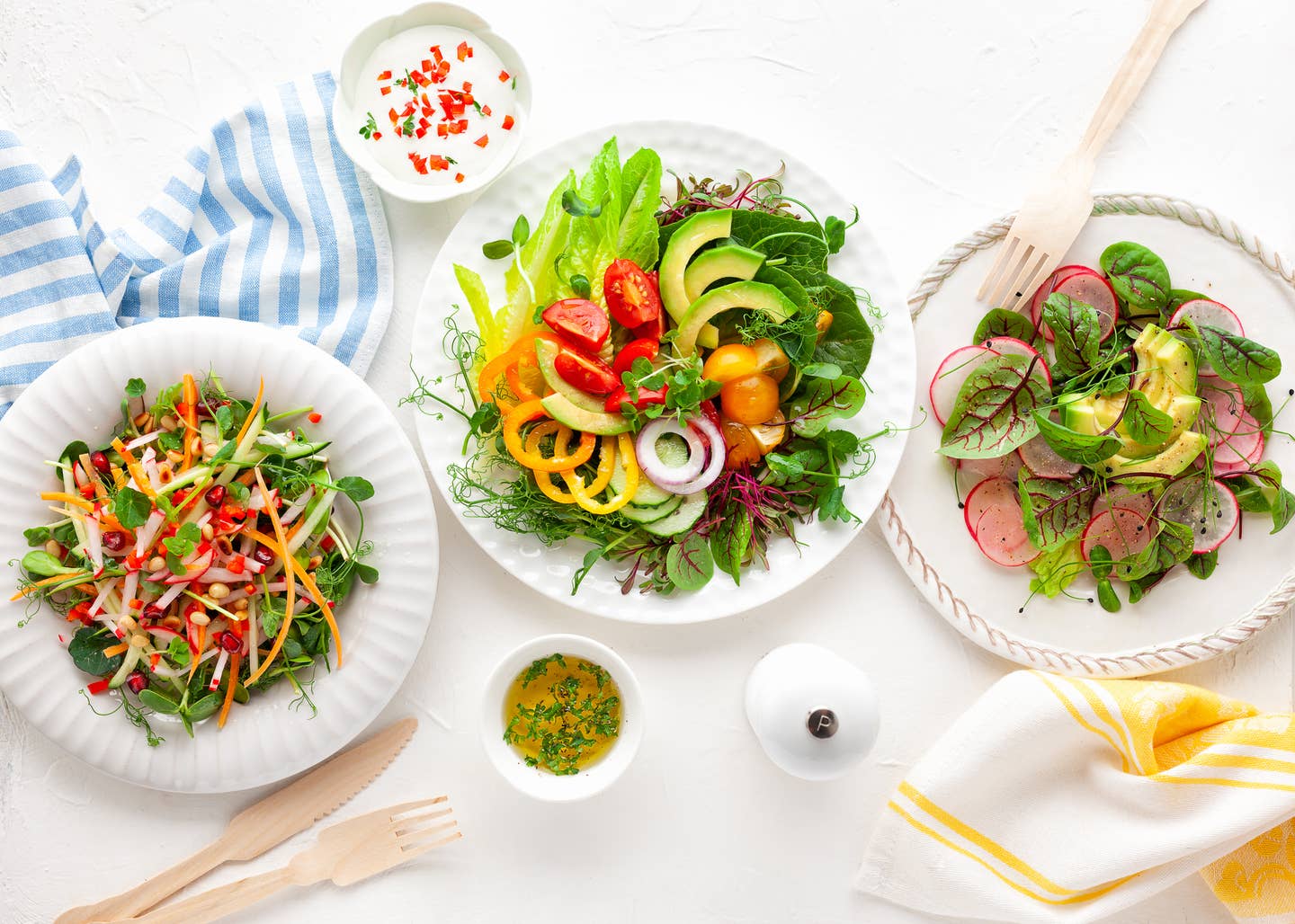
Boost Your Energy on a Plant-Based Diet; Here’s Exactly What to Eat
When longtime omnivore Kerri Tower switched to a vegan diet, she noticed her energy flag after high-starch, low-fiber meals like vegan (no cheese) pizza and pasta. “But when I’d eat a salad or other plant-packed nutrient-dense food, like lentil soup or tofu curry with quinoa, my energy would go right back up,” she says. To help new and veteran vegans make the most of every bite, we asked registered dietitian and nutritionist Malina Malkani for tips on what to eat to get through the day without crashing.
1) Just Because It’s Vegan Doesn’t Mean It’s Good for You
“One of the biggest traps people fall into is thinking that all vegan food is healthy,” Malkani says. Many junk foods like chips and baked goods are technically plant-based, but they don’t offer much in the way of sustenance.
So what vegan foods give you the most energy? Minimally processed whole foods are the way to go. “During food processing, some of the health-promoting nutrients get stripped out,” like fiber, micronutrients, vitamins, and minerals, she says. Even some meat alternatives aren’t as sustaining as, say, beans because they go through so much before they reach your plate.
Bottom line: Choose whole foods with as much fiber and nutrient dense vegetables and legumes, eat the color of the rainbow at every meal and stay away from carbs.
2) Two (or More) Food Groups Are Better Than One
Ever wonder why an apple with peanut butter makes such a satisfying snack? Malkani says it’s a healthful go-to because it combines food groups: The apple provides carbs for instant energy, while the peanut butter keeps you going longer thanks to its protein and fat.
For the combos, look for ways of combining macronutrients (so, carbs with either a fat or a protein), because carbs are great for quick energy but if you eat them by themselves they won't keep you going for very long, since they're quick-burning, whereas fat and protein together burn more slowly, sustaining you for longer.
No surprise to anyone who has tried to cut carbs and found their energy and focus flagging, if you need a quick pop of energy, the magic ingredient is carbs—they're the brain's preferred energy source—(but choose less-processed ones vs. something refined like candy). However, if you don't balance them with a slower-burning source of energy, like protein or fat, then you're still going to burn out, or need to eat again very soon after.
Another favorite of Malkani’s: Sweet potato toast, which “pairs well with things you wouldn’t even imagine,” making it easy to layer on your protein-rich spread of choice. Slice ¼-inch sweet potato slabs, roast on 400 degrees for about 30 minutes, and top with almond butter, banana, and chia seeds, or add hummus, sliced olives, and cucumbers. You can even roast the sweet potato slices ahead of time, freeze, then pop one in the toaster when you’re ready for a quick bite.
“You can apply the same principle to meals, but pull from more than two food groups,” she says. You don’t have to cram in every food group at every meal, since “that’s a tall order.” Instead, think about fulfilling your daily needs over the course of the whole day.
3) Make Sure You’re Eating Enough
People who try to limit their intake -- for any reason, whether it's to be plant-based or avoid gluten, go keto or try intermittent fasting -- often have lower overall energy, Malkani says, so it’s important to make sure you’re getting the calories your body needs. If your diet is full of whole foods and you’re combining food groups at meals and snacks and you're still low-energy, then you may want to meet with a registered dietician nutritionist—find one at eatright.org.
And while it’s a common assumption that vegan diets are low in protein, it's not the case. In fact, most people eating a plant-based diet find that they can get enough protein from legumes like lentils, beans, soy, tofu, peas, and other sources. And athletes have been increasingly taking up vegan or plant-based diets and proving that they can play at the top of their game on plant-based sources of proteins (as the recently released documentary, The Game Changers is showing us). “it’s rare not to get enough protein” Malkani says. You may simply need to pay more attention to what you’re eating, to be sure you’re hitting the mark.
Other nutrients to you may want to keep in mind if you are worried about getting enough nutrients or have energy lows: Calcium, vitamin D, vitamin B12, and iodine. For a list of the best sources of calcium see The Beet's story on The Ten Best Plant-Based Sources of Calcium and How Much You Really Need. As for supplements, most Americans, regardless of their diet, don't routinely get enough vitamin D and B12, since these are hard to get enough of in a healthy, balanced diet. As for iodine, it is found in whole grains, green beans, kale, watercress, strawberries and organic potatoes with skin and of course, iodized salt.
4) Energy Crashes Happen—Here’s What to Do
You’re at an afternoon movie and enjoy a soda and a candy bar from the concession stand. Or you’re starving at work and the vending machine stocks only processed bags of chips, chips, and more chips—so chips it is. Then, half an hour later, you’re feeling sluggish and even hungry again.
Sweet foods, processed snacks and sugary beverages that are carbohydrate-rich cause your blood sugar to spike and then dip, explains Malkani. If you’re crashing after treating yourself to a snack, make your next snack or meal is high fiber, whole food or protein-rich. Keep a container of almond butter handy and spread it on an apple slice. Avoid simple carbs and choose foods you could grow if you had the opportunity!
5) It’s Not Just About Food
Water and sleep play a role if you're no an energy rollercoaster so take a look at whether you're not getting to sleep before midnight, or if you're constantly dehydrated. “Energy levels are dependent on food, “but they’re also dependent on rest and healthy lifestyle behaviors,” she explains. So if you’re burning the candle at both ends— don't expect to feel perky, even if you’re eating all the right stuff. Cut back on caffeine which can rob both sleep and dehydrate you. Enjoy a lemon water with a sprig of mint in the afternoon at your desk. The mint is invigorating and the lemon has vitamin C, which allows nutrients like calcium to be absorbed in the healthy food you are eating. In other words, tweak your good habits and make them even better, and your energy level is likely to respond in time. If you're not seeing positive changes to your energy, then, of course, seek the advice of a medical professional since it could be a sign of something else going on and it's always a great idea to be reassured.
More From The Beet






